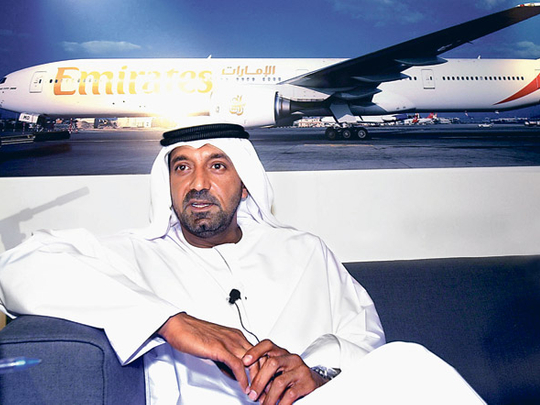
Dubai: As head of Dubai's Supreme Fiscal Committee, Shaikh Ahmad Bin Saeed Al Maktoum is in charge of the recovery process of Dubai's economy.
And as President of Dubai Civil Aviation and Chairman and CEO of Emirates Airline and Group, he has been at the centre of rumours that Dubai's airline, along with other key assets, might be handed over to Abu Dhabi in return for the larger emirate's help.
But according to Shaikh Ahmad, sitting in his modest office on the first floor of the old Terminal 1 at Dubai International Airport, such terms were never discussed during the negotiations with Abu Dhabi.
"We never really talked about any of our strategic companies with Abu Dhabi," he says. "I know it's always been the rumour. When you think about what Emirates has achieved I think anyone would want to have equity in it. It's a very successful business for Dubai."
Far from handing Emirates over to Abu Dhabi, or merging it with Etihad, Shaikh Ahmad believes the carrier can be a catalyst for Dubai's revival.
Emirates airline is highly profitable and isn't struggling to service its debt or secure more financing from international banks for fleet expansion.
On the map
"The airline put Dubai on the world map," he says, adding that the airline's 32,000-strong workforce makes it Dubai's biggest employer. "We've put a lot into the Dubai economy. The number of units we rent within the local market, the expenditure of the staff and how much it brings people to Dubai. If it wasn't for Emirates, this market wouldn't have been able to grow as it has. It's one of the core businesses of Dubai."
Shaikh Ahmad and a close-knit group of long-serving executives including group vice-chairman Maurice Flanagan and president Tim Clark have built the company into a global player with $55 billion (Dh202 billion) of plane orders in the pipeline and the world's largest fleet of A380 aircraft. Emirates indirectly contributes Dh40 billion to Dubai's economy each year, according to Shaikh Ahmad.
Running parallel to the rumour that the airline might be handed over to Abu Dhabi has been speculation that Dubai might look to sell shares through an initial public offering and raise billions of dollars in much needed funds for the emirate.
"If Emirates decided to IPO I'm sure it will be good, especially if it's placed within the UAE stock markets," says Shaikh Ahmad. "It will see a lot of people trading in it. I will look at it as a positive thing. But as we speak today I don't have any direction from the government to do this."
Recently, more of Shaikh Ahmad's time has been taken up with meetings of the Supreme Fiscal Committee. He reports to His Highness Shaikh Mohammad Bin Rashid Al Maktoum, Vice-President and Prime Minister of the UAE and Ruler of Dubai.
"I've been doing more work for my other responsibilities recently. I feel it's my duty, being responsible for the achievement of Dubai," says Shaikh Ahmad. "That's why I have to give Dubai my ultimate time doing any job that His Highness gives me. I'm giving my time more to what's the most important thing. It's not that the other isn't important, but Emirates is straightforward."
Confidence
For the time being this means focusing on Dubai's economy and helping to restore confidence. Shaikh Ahmad believes that Dubai should look to its past in order to plot a sustainable course for growth in the future.
He says: "Dubai as a place was well known in the region, within the Gulf and the Middle East and the emerging markets mainly due to re-exports, being a logistic hub, tourism — a place to do business from. A lot of countries see that Dubai will continue to be that place for now and even for the future."
Shaikh Ahmad says the main aim of the fiscal committee is to get Dubai's economic growth back on track by refocussing efforts on the sectors that were overshadowed by real estate speculation.
Dubai's core businesses are logistics, services and tourism and export, he says. "This is what made Dubai move forward, not what happened in the past seven years in opening the real-estate market."
He added: "Some people think that they're not doing too well because they're taking 2007 as a benchmark, but sometimes we have to realise that you can't always achieve 30 to 40 per cent growth."












